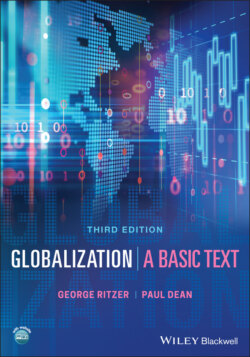Читать книгу Globalization - George Ritzer - Страница 66
NOTES
Оглавление1 1 The title of this chapter is derived from an anthology the first author edited many years ago. See Ritzer (1972).
2 2 Immigrants can be thought of as “transnational” when they are involved in a variety of relationships (e.g. social, economic, political) that cut across the nations of settlement and origin creating a new transnational field (Basch et al. 1994). While there are certainly many immigrants who fit into this category and their number is likely growing, there has been a tendency to overestimate their number and to conflate transmigrants and immigrants. Thus, Portes (2001a: 183) concludes: “It is more useful to conceptualize transnationalism as one form of economic, political and cultural adaptation that co-exists with other, more traditional forms [e.g. assimilation].” He usefully limits the idea of transnational activities to “those initiated and sustained by non-institutional actors, be they organized groups or networks of individuals across national borders. Many of these activities are informal, that is they take place outside the pale of state regulation and control… . they represent goal-oriented initiatives that require coordination across national borders by members of civil society. These activities are undertaken on their own behalf, rather than on behalf of the state or corporate bodies” (Portes 2001a: 186).
3 3 By the way, this idea of such a basic “urge” is quite controversial and is critiqued by postmodernists (and others) as being suggestive of “essentialism,” or the notion that there is some fundamental characteristic of humans that lies at their essence and explains much of what they do. See Ritzer (1997).
4 4 Robertson’s analysis ends at this point since his essay was published in 1990.
5 5 Goffman (1961: 81). The quotation: “To be awkward or unkempt, to talk or move wrongly, is to be a dangerous giant, a destroyer of worlds. As every psychotic and comic ought to know, any accurately improper move can poke through the thin sleeve of immediate reality.”
